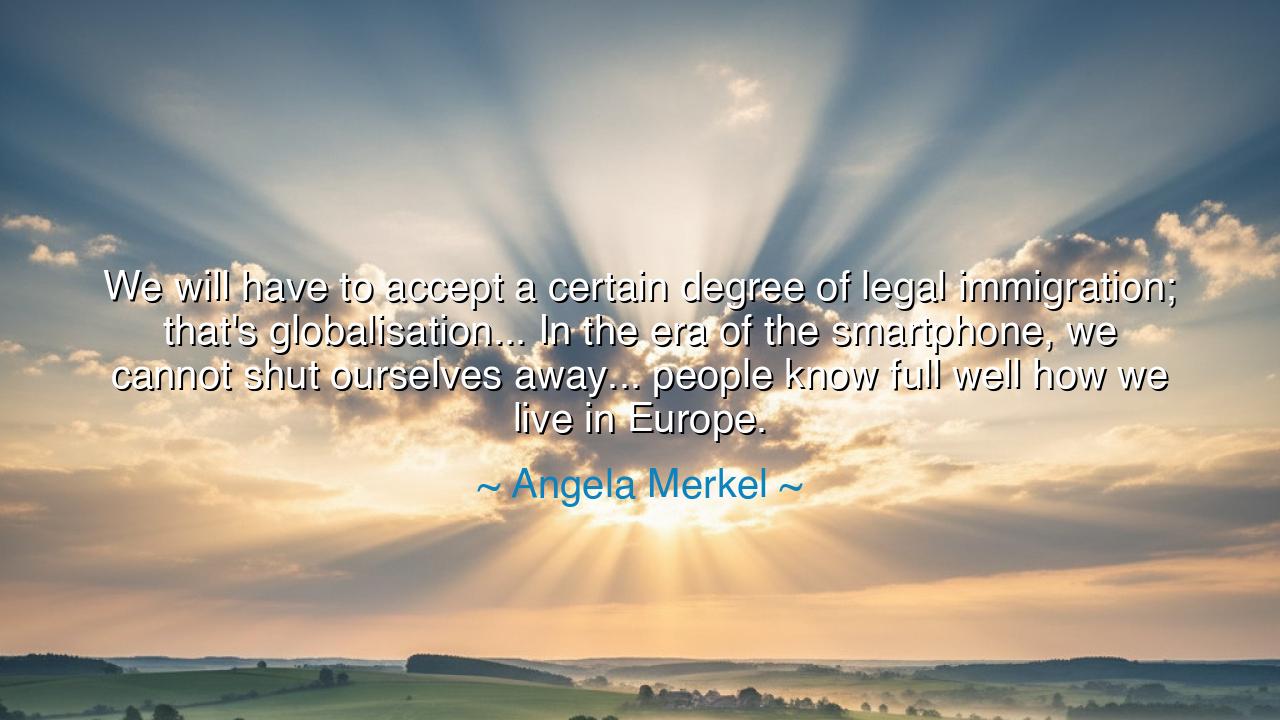
We will have to accept a certain degree of legal immigration;
We will have to accept a certain degree of legal immigration; that's globalisation... In the era of the smartphone, we cannot shut ourselves away... people know full well how we live in Europe.






Hear now the voice of a ruler who bore the burdens of her people and spoke with calm clarity amidst the storms of her age: Angela Merkel, chancellor of Germany, who declared, “We will have to accept a certain degree of legal immigration; that’s globalisation… In the era of the smartphone, we cannot shut ourselves away… people know full well how we live in Europe.” These words, though plain, carry the force of prophecy. They are not only the utterance of a stateswoman but also the lament and wisdom of one who understood the tides of the world.
For what is globalisation, if not the weaving of nations into one fabric, the unsealing of borders not by sword, but by knowledge, by commerce, by the silent stream of information that pours from every glowing screen? In the era of the smartphone, the illusions of isolation are shattered. No wall is high enough, no gate strong enough, to conceal the abundance of one land from the hunger of another, nor the freedom of one people from the oppression of another. The poor of distant lands see the wealth of Europe in the palm of their hand; the oppressed glimpse liberty shining just beyond the sea. And having seen it, they will not remain still.
Mark this truth in the record of ages past. When the Israelites heard tell of Canaan, the land of milk and honey, they marched forth from Egypt’s chains, for no desert could quell their hope once the vision of freedom was kindled. When the peasants of medieval Europe heard of lands beyond the ocean, tales of America where fields were vast and kings did not bind men to the soil, they set sail with trembling hearts, carried only by faith and desperation. Knowledge awakens desire, and desire moves men farther than any army. Thus, Merkel speaks what history has always borne: once a people knows what life might be, they will not forever accept what life is.
In her own time, she beheld the Syrian war, which drove countless souls from their homes. They crossed mountains and seas, not because they were invited, but because suffering pushed them from behind, and the knowledge of a better life pulled them from ahead. The images they saw upon their screens—streets safe, hospitals ready, children in schools—were not illusions but promises whispered across the ether. And though many in Europe feared this flood of strangers, Merkel proclaimed that we cannot shut ourselves away. For to turn one’s back when the world is at your door is not safety, but self-deception.
Yet her words are not only about nations—they speak also to the human heart. How often does a man attempt to build walls around himself, to shut out the cries of those in need, to hoard his wealth, to preserve his peace by closing his eyes? But the truth is this: the world presses upon every heart. The poor man begging at the gate, the refugee seeking a home, the stranger yearning for kindness—all these are mirrors held up to us, showing us what we would hope for if fate had cast our lot differently. To deny this is not strength but fear. To embrace it is to live in accordance with the eternal law of compassion.
Therefore, learn this lesson: isolation is an illusion. Just as Europe cannot hide its prosperity from the gaze of the world, so too can no person hide the light of their life from the eyes of others. We are seen, we are known, and from that knowledge arises responsibility. The wealth you carry, the freedom you enjoy, the dignity you guard—all these are visible to those who lack them, and they will reach toward you, as surely as a drowning man reaches for a hand.
What, then, must you do? First, cast away the fantasy that you can live only for yourself. Share what you have, whether it be bread, wisdom, or compassion, with those who press upon your door. Second, cultivate understanding, for fear is born of ignorance, but wisdom transforms strangers into neighbors. And third, remember always that the smartphone of which Merkel spoke is but the tool of an ancient truth: that man is ever connected to man, and the destiny of one is bound with the destiny of all.
So hear the chancellor’s words as more than politics—they are a call to vision. The age of separation is over. The walls of yesterday have fallen, not by battering rams, but by knowledge and longing. The question is not whether you will live with the stranger, but how you will live with him. Choose, then, the path of generosity and courage, that your descendants may say of you: they did not shut themselves away, but opened the gates of their hearts to the world.






AAdministratorAdministrator
Welcome, honored guests. Please leave a comment, we will respond soon